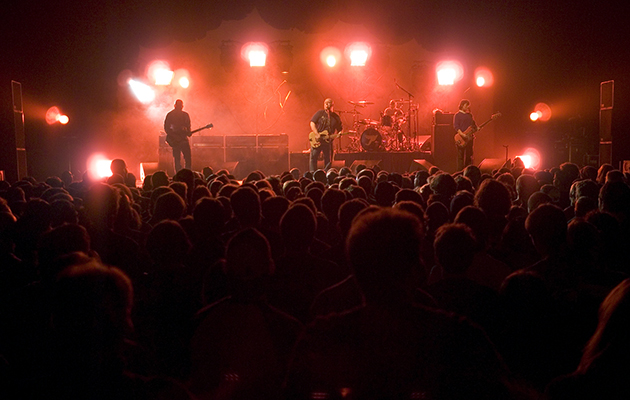http://www.youtube.com/watch?v=3sW3zoANMp4
Charles Michael Kittridge Thompson IV was born on April 4, 1965 to a family who criss-crossed the USA, switching between California and Massachusetts a half-dozen times. His early life mixed the conventional with the utterly bizarre. Raised by hippie-ish middle-class parents, he heard ’60s folk and pop round the home, and his dad was an acquaintance of Captain Beefheart. The first weird break in his upbringing came when a UFO apparently passed over him when he was an infant, fuelling a life-long obsession with outer space and alien abduction. Then, aged 12, his whole family became Born Again.
“I’ve been affected by the charismatic Pentecostal preacher thing,” he confessed in 1988. “I grew up exposed to a lot of preaching and righteous rage, and though I’ve rejected the content of all that, the style has left an impression on me. It was pretty American: all hand-clapping, Heaven and Hell and sin. It was all ‘RRRRREPENT!’ and ‘GOD!’ I was 12 and religion came over my entire family. But it began to fade when I was about 17. It left me fucked up, that’s for sure.”
“I think that religious phase translated into his rock’n’roll phase,” the Pixies’ first producer, Gary Smith, considers. “The speaking in tongues thing that he did as a Jesus freak is exactly the sort of music he did later. It seemed like a period that had been disregarded and shed when I met him. But no-one who touches that spiritual space comes back the same.”
When he arrived at the University of Massachusetts in 1984 to study anthropology, Thompson seemed ordinary enough. “He was a cheerful guy,” Santiago remembers. “Happy-go-lucky. Glad to be in school.” Santiago was in the dorm room opposite, a Filipino who had moved to the US aged seven, ending up in a Massachusetts suburb, where Iggy Pop records had helped ease his outsider status. Both men had arrived in college hoping to form bands, and bonded over music, Santiago introducing his friend to rock’s wilder fringes.
Soon, The Violent Femmes, Talking Heads, Hüsker Dü, The Jesus & Mary Chain and copious dope-smoking filled Thompson’s time. Dinosaur Jr’s J Mascis, also at the college then, remembered him talking about the Bible and being a rock star. An exchange trip to Puerto Rico added a layer of Latin life and Spanish language to Thompson’s experiences. But it was while there that he wrote to Santiago, declaring their education at an end.
“I was all for it,” Santiago tells Uncut. “I got sick of the same routine. I wasn’t going to drop out of school if Charles had been some sort of joker. But I’d heard his songs, and they weren’t like anything else. I knew we had a good shot at being successful.”
Kim Deal answered their ad for a female bass player into “Peter, Paul & Mary and Hüsker Dü”. She worked in a doctor’s office in Boston, but had a past back home in Ohio playing music at truck stops with her twin sister Kelley. They called themselves The Breeders. Rock’n’roll had entered Kim’s life when Kelley returned from seeing Led Zeppelin’s The Song Remains the Same as a young teen, the sisters dropping acid and smoking as they discussed it in their backyard. Thompson offered Kelley the $50 fare from Ohio to be their drummer, but she declined. Kim remembered a drumming friend of her husband, David Lovering, who became the band’s only Boston native. Santiago named them Pixies In Panoply: swiftly shortened to the Pixies.
“We’re not four peas in a pod, we’re four completely different people,” Thompson advises today. “We were brought together completely by accident, not by design.” Their distinctness made them fascinating; it guaranteed future conflict, too.
Santiago’s optimism for the band at their start, though, was well placed. American mainstream rock was comatose, ruled by airbrushed metal and AOR without ideas or threat (even Guns N’Roses and Metallica had yet to impact). The underground, meanwhile, was another world in the early ’80s, a self-sufficient parallel universe with no interest in pop, and no avenue to the surface. Black Flag had split up mere months earlier, and the austere, alienated, thrashing aggression of their hardcore punk scene still dominated. Hüsker Dü’s reintroduction of melody and older rock values to still furious noise had been noted by Thompson, but their attempt to reach a wider America by signing to a major label was sputtering out in 1986; even R.E.M. had only made minor headway, while older avatars like Talking Heads were splitting up. Rock was in flux, ripe for the taking. In Dave Lovering’s parents’ garage, with rigorous discipline, the Pixies honed their assault.
“We never thought, ‘What are our chances of succeeding?’ ” Says Santiago. “Just kept practising. We had a really good work ethic. We had a schedule. We met after work, we’d bash it out for three or four hours.” Santiago’s unique guitar sound was forged in these sessions – brief, violent flashes, more fluent than hardcore, without metal’s excess, but aggressive, in a way inexplicable when you saw the still, introverted man playing. With Thompson, they discussed scalpelling out anything they’d heard before.



